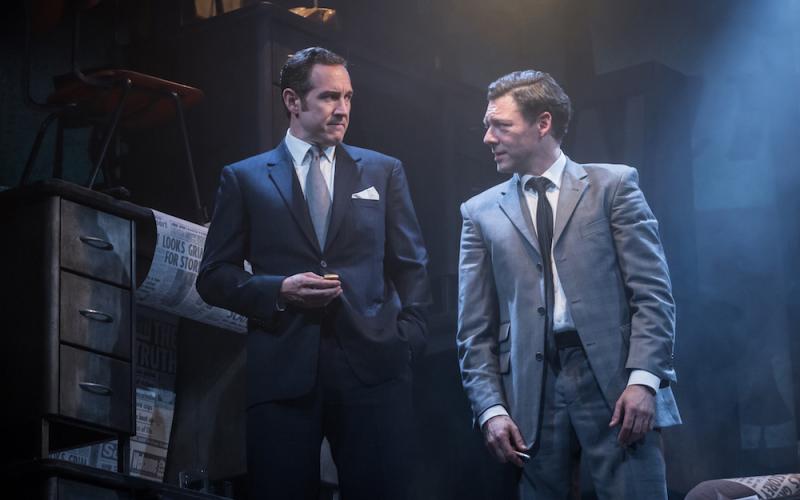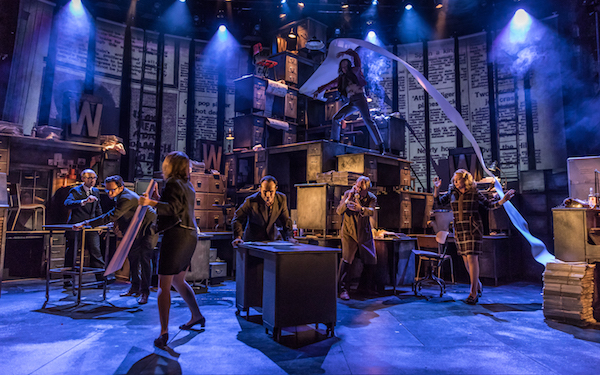Ink, Almeida Theatre review - The Sun rises while show sinks | reviews, news & interviews
Ink, Almeida Theatre review - The Sun rises while show sinks
Ink, Almeida Theatre review - The Sun rises while show sinks
Rupert Murdoch saga by ‘This House’ playwright is too detailed and overblown

The recent general election result proves that the power of the rightwing press has diminished considerably in the digital age, but there was a time when media magnate Rupert Murdoch could make grown-up politicians quake in their socks.
Graham tells the eye-opening story of how Murdoch bought the ailing Sun newspaper and turned it into Britain’s most popular tabloid by focusing on the tycoon’s relationship with Larry Lamb, the paper’s new editor, and the rivalry between Lamb and his former boss, the Mirror editor Hugh Cudlipp. At the start, Murdoch has to snap Lamb out of his traditional Fleet Street somnolent habits, inspiring him to break the rules and become more populist. Gradually, the pupil begins to outstrip (especially as regards Page Three) the master as he learns the dark art of giving people what they didn’t even know they wanted: sex, fun and humour.
The play talks too much about stories, but shows too few of them
In the process, Lamb clashes with Cudlipp, a kind of father figure, who represents patrician conscience rather than popular commerce. Murdoch gives his man a year to make the Sun a better-selling paper than the Mirror. Schematically, Cudlipp’s definition of journalistic values – worthy, responsible and politically articulate – is a thing of the past; Lamb is the man of the future, who redefines the nature of working-class journalism. But Graham also has another agenda: this is also a play about storytelling, both in newspapers and in the theatre. His elaborate first scene focuses on the five Ws of journalism – who, what, where, when, and why – with a neat little twist.
The main problem with the play, however, is that it talks too much about stories, but shows too few of them. For example, the most dramatic thing to happen to the Sun in its first year under Murdoch was the kidnap of Mrs Muriel McKay, the wife of Sir Alick McKay, the deputy chairman. The cynical way in which Lamb exploits this terrible event is not only full of drama, but also points forward to the Sun’s later outrageous behaviour and flouting of journalistic ethics. It was the first step on the road to The News of the World phone-hacking. But it is not until way into the second half of this three-hour evening that we get to this story.
 Before then, we get a long introduction to the Sun’s new staff, a lecture on tabloid design and another on hot-metal printing. There are also episodes about archaic trade union practices (remember them?) and emerging feminism. Murdoch gives the cosy British Establishment frequent tongue-lashings. These are fascinating topics, but their inclusion does slow down the play, sucking out its dramatic life. Graham has clearly done a lot of reading, but he should know by now that good writers have to cut their research and concentrate on the main game. Of course, all of this material is presented in a lively, colourful and engaging way by director Rupert Goold, who turns circulation wars into a horse race, but all this is mostly extraneous to the crucial core of the narrative. The detail is great for journalism buffs, but its inclusion feels like unnecessary padding. The song-and-dance ensemble scenes, designed by Bunny Christie on a pyramid of desks (pictured above), look great, but add little to the tale.
Before then, we get a long introduction to the Sun’s new staff, a lecture on tabloid design and another on hot-metal printing. There are also episodes about archaic trade union practices (remember them?) and emerging feminism. Murdoch gives the cosy British Establishment frequent tongue-lashings. These are fascinating topics, but their inclusion does slow down the play, sucking out its dramatic life. Graham has clearly done a lot of reading, but he should know by now that good writers have to cut their research and concentrate on the main game. Of course, all of this material is presented in a lively, colourful and engaging way by director Rupert Goold, who turns circulation wars into a horse race, but all this is mostly extraneous to the crucial core of the narrative. The detail is great for journalism buffs, but its inclusion feels like unnecessary padding. The song-and-dance ensemble scenes, designed by Bunny Christie on a pyramid of desks (pictured above), look great, but add little to the tale.
Still, Carvel has plenty of attractively silky charm and gives Murdoch – who like the Devil gets most of the best tunes – a fair dollop of youthful energy, while Richard Coyle’s increasingly desperate and savage Lamb grows in stature as he discovers the thrills of populism. By contrast, David Schofield as Cudlipp conveys the anguish of an avuncular man whose time is past, and Justin Salinger and Sophie Stanton give life to a couple of the staffers. The female point of view is briefly articulated by Pearl Chanda, who plays the model Stephanie. Despite a large and hardworking ensemble, this does feel like a documentary in search of a stronger story.
rating
Explore topics
Share this article
The future of Arts Journalism
You can stop theartsdesk.com closing!
We urgently need financing to survive. Our fundraising drive has thus far raised £49,000 but we need to reach £100,000 or we will be forced to close. Please contribute here: https://gofund.me/c3f6033d
And if you can forward this information to anyone who might assist, we’d be grateful.

Subscribe to theartsdesk.com
Thank you for continuing to read our work on theartsdesk.com. For unlimited access to every article in its entirety, including our archive of more than 15,000 pieces, we're asking for £5 per month or £40 per year. We feel it's a very good deal, and hope you do too.
To take a subscription now simply click here.
And if you're looking for that extra gift for a friend or family member, why not treat them to a theartsdesk.com gift subscription?
more Theatre
 Edinburgh Fringe 2025 reviews: The Fit Prince / Undersigned
A joyful gay romance and an intimate one-to-one encounter in two strong Fringe shows
Edinburgh Fringe 2025 reviews: The Fit Prince / Undersigned
A joyful gay romance and an intimate one-to-one encounter in two strong Fringe shows
 Tom at the Farm, Edinburgh Fringe 2025 review - desire and disgust
A visually stunning stage re-adaptation of a recent gay classic plunges the audience into blood and earth
Tom at the Farm, Edinburgh Fringe 2025 review - desire and disgust
A visually stunning stage re-adaptation of a recent gay classic plunges the audience into blood and earth
 Works and Days, Edinburgh International Festival 2025 review - jaw-dropping theatrical ambition
Nothing less than the history of human civilisation is the theme of FC Bergman's visually stunning show
Works and Days, Edinburgh International Festival 2025 review - jaw-dropping theatrical ambition
Nothing less than the history of human civilisation is the theme of FC Bergman's visually stunning show
 Every Brilliant Thing, @sohoplace review - return of the comedy about suicide that lifts the spirits
Lenny Henry is the ideal ringmaster for this exercise in audience participation
Every Brilliant Thing, @sohoplace review - return of the comedy about suicide that lifts the spirits
Lenny Henry is the ideal ringmaster for this exercise in audience participation
 Edinburgh Fringe 2025 reviews: The Beautiful Future is Coming / She's Behind You
A deft, epoch-straddling climate six-hander and a celebration (and take-down) of the pantomime dame at the Traverse Theatre
Edinburgh Fringe 2025 reviews: The Beautiful Future is Coming / She's Behind You
A deft, epoch-straddling climate six-hander and a celebration (and take-down) of the pantomime dame at the Traverse Theatre
 Good Night, Oscar, Barbican review - sad story of a Hollywood great's meltdown, with a dazzling turn by Sean Hayes
Oscar Levant is an ideal subject to refresh the debate about media freedom
Good Night, Oscar, Barbican review - sad story of a Hollywood great's meltdown, with a dazzling turn by Sean Hayes
Oscar Levant is an ideal subject to refresh the debate about media freedom
 Edinburgh Fringe 2025 reviews - Monstering the Rocketman by Henry Naylor / Alex Berr
Tabloid excess in the 1980s; gallows humour in reflections on life and death
Edinburgh Fringe 2025 reviews - Monstering the Rocketman by Henry Naylor / Alex Berr
Tabloid excess in the 1980s; gallows humour in reflections on life and death
 Edinburgh Fringe 2025 reviews: Lost Lear / Consumed
Twists in the tail bring revelations in two fine shows at the Traverse Theatre
Edinburgh Fringe 2025 reviews: Lost Lear / Consumed
Twists in the tail bring revelations in two fine shows at the Traverse Theatre
 Make It Happen, Edinburgh International Festival 2025 review - tutting at naughtiness
James Graham's dazzling comedy-drama on the rise and fall of RBS fails to snarl
Make It Happen, Edinburgh International Festival 2025 review - tutting at naughtiness
James Graham's dazzling comedy-drama on the rise and fall of RBS fails to snarl
 Edinburgh Fringe 2025 reviews: I'm Ready To Talk Now / RIFT
An intimate one-to-one encounter and an examination of brotherly love at the Traverse Theatre
Edinburgh Fringe 2025 reviews: I'm Ready To Talk Now / RIFT
An intimate one-to-one encounter and an examination of brotherly love at the Traverse Theatre
 Top Hat, Chichester Festival Theatre review - top spectacle but book tails off
Glitz and glamour in revived dance show based on Fred and Ginger's movie
Top Hat, Chichester Festival Theatre review - top spectacle but book tails off
Glitz and glamour in revived dance show based on Fred and Ginger's movie
 Edinburgh Fringe 2025 reviews: Alright Sunshine / K Mak at the Planetarium / PAINKILLERS
Three early Fringe theatre shows offer blissed-out beats, identity questions and powerful drama
Edinburgh Fringe 2025 reviews: Alright Sunshine / K Mak at the Planetarium / PAINKILLERS
Three early Fringe theatre shows offer blissed-out beats, identity questions and powerful drama

Add comment